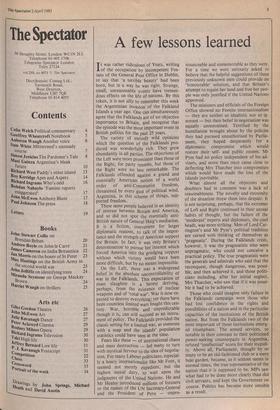A few lessons learned
It was rather ridiculous of Yeats, writing of the occupation by incompetent Fen-
ians of the General Post Office in Dublin, to say that 'a terrible beauty' had been born, but in a way he was right. Strange, small, unreasonable events have tremen- dous effects on the life of nations. By this token, it is not silly to remember this week the Argentinian invasion of the Falkland Islands a year ago. One can simultaneously agree that the Falklands are of no objective importance to Britain, and recognise that the episode was the most important event in British politics for the past 25 years.
The variety of entirely wild opinions which the question of the Falklands pro- duced was wonderfully rich. They grew abundantly in all parties. The objections of the Left were more prominent than those of the Right, for party reasons, but those of the Right were no less remarkable. The Falklands offended against a grand and essentially American notion of a world order of anti-Communist freedom, threatened by every gust of political wind. Argentina, in this scheme of things, sup- ported freedom.
These same people believed in an identity of interest between Britain and America, and so did not spot the essentially anti- British nature of General Haig's mediation. It is a fiction, convenient for larger diplomatic reasons, to talk of the impor- tance and the strength of American support for Britain. In fact, it was only Britain's determination to pursue her interest which forced America into the grudging support without which victory would have been more difficult, but by no means impossible.
On the Left, there was a widespread belief in the absolute uncontrollability of war in the Falklands. This expectation of mass slaughter is a heresy deriving, perhaps, from the existence of nuclear weapons and of 'total war'. War is now ex- pected to destroy everything; yet there have been countless limited wars fought this cen- tury. War, horrible and unpredictable though it is, can still succeed as an instru- ment of policy. The Falklands provided the classic setting for a limited war, as someone with a map and the islands' population statistics could have seen at the time.
Fears like these — of international chaos and mass destruction — led many to turn with mystical fervour to the idea of negotia- tion. For many Labour politicians, especial- ly a hoary internationalist like Mr Foot, it seemed not merely expedient, but the highest moral duty, to wait upon the judgments of the United Nations. He and Mr Healey introduced millions of listeners to the names of the UN Secretary-General and the President of Peru — unpro-
nounceable and unmemorable as they were. For a time we were seriously asked to believe that the helpful suggestions of these previously unknown men could provide an 'honourable' solution, and that Britain's attempt to regain her land and free her peo- ple was only justified if the United Nations approved.
The ministers and officials of the Foreign Office showed no Footite internationalism — they are neither so idealistic nor so ig- norant — but their belief in negotiation was equally unrestrained. Terrified by the humiliation brought about by the policies they had pursued unauthorised by Parlia- ment, they hoped desperately for a diplomatic compromise which would restore their self- and public esteem. Mr Pym had no policy independent of his ad- visers, and more than once came close to deflecting Mrs Thatcher into compromises which would have made the loss of the islands inevitable.
What almost all the objectors and doubters had in common was a lack of reasonableness. The novelty and extremity of the situation threw them into despair. It is not surprising, perhaps, that the extremes of Left and Right continued in their unreal habits of thought, but the failure of the 'moderate' experts and diplomats, the cool heads, was more striking. Men of Lord Car- rington's and Mr Pym's political tradition are cursed with thinking of themselves as 'pragmatic'. During the Falklands crisis, however, it was the pragmatists who were unpragmatic, who could not conceive a practical policy. The true pragmatists were the generals and admirals who said that the reconquest, though dangerous, was possi- ble, and then achieved it, and those politi- cians including, after her initial neglect, Mrs Thatcher, who saw that if it was possi- ble it had to be achieved.
Those who could imagine only failure in the Falklands campaign were those who had lost confidence in the rights and possibilities of a nation and in the particular capacities of the institutions of the British nation. But from the Falklands two of the most important of those institutions emerg- ed triumphant. The armed services, so notable in their contrast to their politicised power-seeking counterparts in Argentina, refuted 'intellectual' scorn for their stupidi- ty. Above all, Parliament, thought by so many to be an old-fashioned club or a mere bear garden, became, as it seldom seems in normal times, the true representative of the nation that it is supposed to be. MPs saw what had to be done more clearly than did civil servants, and kept the Government on course. Politics has become more sensible as a result.






































 Previous page
Previous page